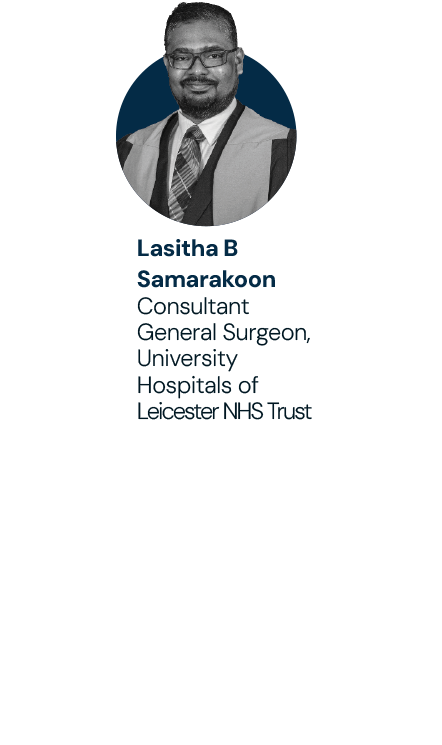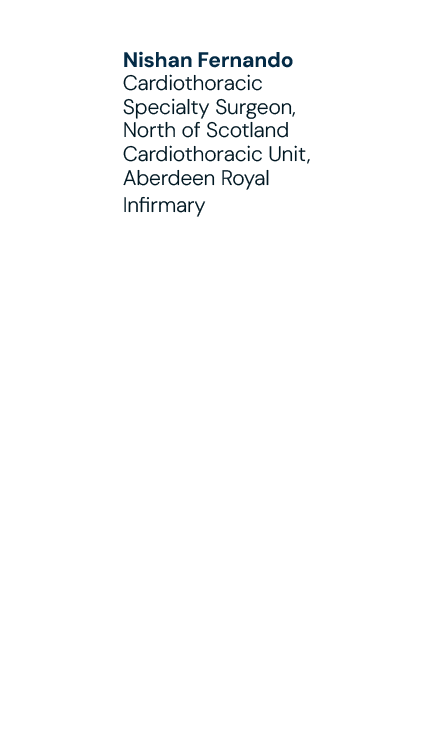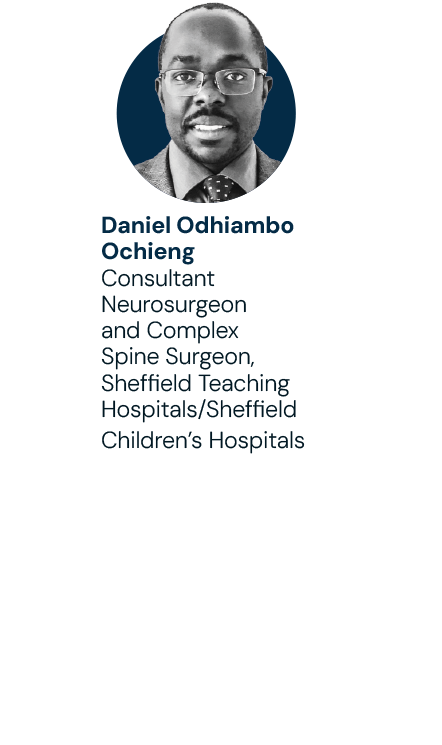Updates from the SAS LED committee
Lasitha B Samarakoon, Nishan Fernando and Daniel Odhiambo Ochieng share some of their valuable work with the Specialist, Associate Specialist, and Locally Employed Committee

I am Dr Lasitha B Samarakoon and I work as an LE Consultant General Surgeon, based in Leicester, United Kingdom. I am a Fellow of the Royal College of Surgeons of Edinburgh and also represent the Specialist, Associate Specialist and Locally Employed (SAS LED) Committee as well as the General Surgical Specialty Board (GS SSB) as the SAS LED Committee Representative.
Under the guidance of the Chair of the GS SSB, Mr Chelliah Selvasekar, collectively we have achieved many milestones in the advancement of SAS LED doctors’ careers and interests and here I wish to outline a few of these achievements.
1. Achieving the examiner status for the MRCS Examinations in General Surgery. This was a huge achievement and would not have been possible without the support and input from the President of RCSEd, Prof Rowan Parks; the Vice-President, Prof Tim Graham; the GS SSB Chair, Mr Selvasekar, and the entire Council. I encourage all SAS LED doctors to take up this opportunity to apply to become examiners to contribute to the training of future surgeons.
2. Establishing SAS LED doctors as college assessors. With the support of the GS SSB and under the guidance of the Council, we have now established an opportunity for SAS LED doctors to contribute towards College quality assurance work as College assessors. Quality assurance is a vital part of the College’s commitment to surgical education and training. I would encourage all SAS LED doctors to take advantage of these opportunities and contribute to the College’s commitment to maintaining high standards of education and training.
3. Providing various educational resources for SAS LED doctors in conjunction with the GS SSB. The GS SSB has conducted an excellent series of webinars and masterclasses aimed at general surgical trainees as well as SAS LED doctors who are preparing for the MRCS and FRCS examinations. In addition to this, an FRCS examination preparation webinar series is planned as a collaboration between the GS SSB and the Trainees’ Committee.
I would also like to encourage all SAS LED doctors to use these resources to advance their knowledge and skills and to get through the professional examinations.
The Cardiothoracic SSB: significant changes
There have been some very significant changes in specialty training in general and, more specifically, in cardiothoracic surgery. Many of these changes affect SAS LED surgeons and our career progression.
1. Changes to the pathways to specialist registration
First, national recruitment to ST3 is closed. To address the anticipated shortfall in thoracic surgeons, recruitment at ST4 level to thoracic surgery in limited numbers is open pro tem but this is very much a short-term intention.
There have been fundamental changes to the CESR pathway/‘The Portfolio Pathway’, with competence, rather than case numbers, taking primacy. It is widely recognised that many associate specialists, specialty surgeons and other locally employed surgeons are already practising autonomously. There is increasing recognition of the part SAS LED surgeons play in the NHS. The avenue of autonomous practice is open to all appropriately trained doctors (within their own level of competence) to accept and treat patients with specific indications in their own name and GMC code. The College and SSB have taken steps to promote and recognise autonomous practice.
2. SAS LED surgeons as assessors
With increasing numbers and responsibility, it is right that SAS LED surgeons are encouraged to play a more significant part in assessment and quality assurance. Fellows in good standing with one of the four Royal Surgical Colleges of Great Britain and Ireland with FRCS(C-Th) are advised to apply for the Panel of Question Writers. There is a RCSEd course on question-writing. Fellows with MRCS are also encouraged to apply to be MRCS Examiners via their own College.
3. Increased training opportunities
Following the training review, NTNs require three days in theatre per week. While the Committee acknowledged the potential negative impact on non-trainees, the importance of addressing the individual training needs of all staff was highlighted. The duration of training is fixed for NTNs and that has to be balanced with the needs of non-trainees and the service. The SSB will be actively exploring novel ways of training to accommodate the needs of all stakeholders.
Neurosurgery SASLC/SSB update: questions and answers
I am Daniel, an LE Consultant Neurosurgeon and Complex Spine Surgeon currently based in Sheffield at the Royal Hallamshire Hospital and Sheffield Children’s Hospital. I joined the RCSEd SASLC (Specialty Doctors, Associate Specialists and Locum Consultants) Committee in 2021 under the leadership of Mr Majid Mukadam and was subsequently seconded to the Neurosurgical Subspecialty Board (SSB) under the leadership of Mr Likhith Alakandy.
Over the past year, the Neurosurgical Subspecialty Board has been supportive of SAS LED doctors in numerous ways.
Support for FRCS exam
Locally employed doctors provide a lot of support in outpatient clinics, neurosurgical theatres and on-call cover for various hospitals and trusts. In order to promote career progression, the SSB is supportive of SAS LED doctors taking the FRCS Collegiate examination in neurosurgery.
With support from local clinical and educational supervisors, the committee is supportive of doctors demonstrating their clinical knowledge and expertise. This is especially useful for career progression and for consideration for application for CESR, or in applying for LE Consultant and Specialist/Associate Specialist substantive jobs.
MRCS and FRCS question-writing
The College, via both the SASLC and SSB, has been supportive of SAS LED colleagues being involved in teaching and examination. We have had post-FRCS LEDs apply to be question-writers and clinical examiners for both the MRCS and FRCS examination. This has enhanced the pool of examiners for the College, both for the JCIE and JSCFE examinations.
Education and professional development courses
With support from RCSEd Council, both the SASLC and SSB have been able to organise neurosurgery educational courses and SAS-specific development days.
We were able to run a paediatric neurosurgical essentials course in Sheffield, led by Mr Ochieng, while Mr Alakandy ran the long-running and successful Complex Spinal Surgery Techniques course in Edinburgh.
The SASLC committee also ran a successful SASLC Conference in Birmingham led by Mr Mukadam and Mr Samarakoon.
Read more




